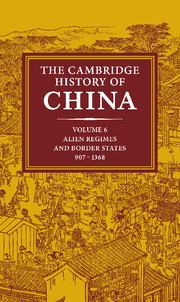Book contents
- Frontmatter
- Introduction
- 1 The Liao
- 2 The Hsi Hsia
- 3 The Chin dynasty
- 4 The rise of the Mongolian empire and Mongolian rule in north China
- 5 The reign of Khubilai khan
- 6 Mid-Yüan politics
- 7 Shun-ti and the end of Yüan rule in China
- 8 The Yüan government and society
- 9 Chinese society under Mongol rule, 1215–1368
- Bibliographical essays
- Bibliography
- Glossary-Index
- MAP 7. The Liao empire, ca. 1045
- MAP 12. The Hsi Hsia state, IIII
- Map 17. The Chin empire
- MAP 32. The Yüan empire">
- References
9 - Chinese society under Mongol rule, 1215–1368
Published online by Cambridge University Press: 28 March 2008
- Frontmatter
- Introduction
- 1 The Liao
- 2 The Hsi Hsia
- 3 The Chin dynasty
- 4 The rise of the Mongolian empire and Mongolian rule in north China
- 5 The reign of Khubilai khan
- 6 Mid-Yüan politics
- 7 Shun-ti and the end of Yüan rule in China
- 8 The Yüan government and society
- 9 Chinese society under Mongol rule, 1215–1368
- Bibliographical essays
- Bibliography
- Glossary-Index
- MAP 7. The Liao empire, ca. 1045
- MAP 12. The Hsi Hsia state, IIII
- Map 17. The Chin empire
- MAP 32. The Yüan empire">
- References
Summary
THE MONGOLIAN PERIOD IN CHINESE HISTORY
The great khan (more properly, khaghan) Khubilai, who had taken that title denoting supreme rule of the Mongolian empire in 1260, took a further step at the end of the year 1271: He proclaimed that starting with the New Year, his government in China would be called the Great Yüan dynasty. He was acting on the advice of Chinese and sinified non-Chinese counselors, and his proclamation employed allusive wordings from Chinese tradition supplied by them. They devised the terminology to place the alien conquest dynasty within the traditions of Chinese statecraft, to express for him benevolent-sounding objectives vis-à-vis his Chinese subjects and their cultural traditions. That gave an appropriate mask to, but did not conceal, the fact that the Mongols had come into China to enrich themselves and sustain their military empire beyond China. They were under pressure to maintain their military and political superiority in China in order to exploit the resources of the world's largest and richest nation. They altered their approaches to that problem successively throughout the 150 years from Chinggis khan's early campaigns against the Jurchen Chin dynasty in 1215 until the Mongols were driven out of China in 1368. Khubilai khan's ceremonious adoption of Chinese dynastic forms in 1272 began the period of greatest Mongolian adaptation to Chinese influences on the patterns of government. Khubilai's long and illustrious reign also marked the fullest regularization of Yüan governing procedures.
Keywords
- Type
- Chapter
- Information
- The Cambridge History of China , pp. 616 - 664Publisher: Cambridge University PressPrint publication year: 1994
References
- 7
- Cited by

